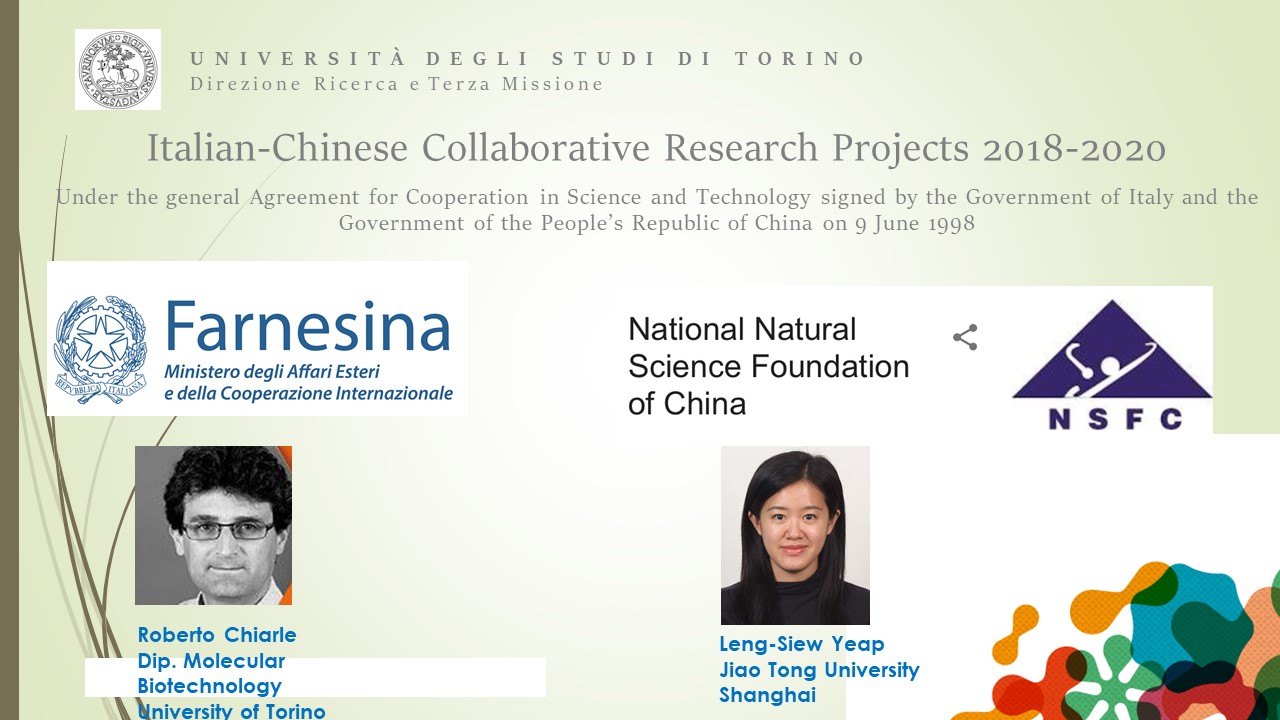Collaborations
|
International collaborative project (2018-2020) with the Shanghai Jiao Tong University supported by the Ministero degli Affari Esteri e della Cooperazione Internazionale (MAECI)
Italian version L'unità italiana e quella cinese si uniranno per raggiungere questo obiettivo. L'unità cinese fornirà le basi molecolari per capire in che modo AID si leghi a sequenze diverse nel genoma umano. L'unità italiana sfrutterà questa nuova conoscenza per comprendere il ruolo patologico di AID nei linfomi e nelle leucemie. L'unità cinese ha già dimostrato che brevi sequenze omologhe di DNA (50bp) nel locus delle immunoglobuline non sono colpite nella stessa maniera dall’attività mutazionale di AID. Questo lascia ipotizzare che esistano fattori addizionali, tra cui diverse combinazioni di sequenze, che determinano una diversa frequenza di mutazioni indotte da AID (Yeap et al., Cell, 2015). L'unità cinese identificherà questi elementi e chiarirà in che modo essi regolino l’attività di AID. I risultati di questo studio chiariranno le modalità con cui AID agisce per generare mutazioni ad alta frequenza selettivamente nei geni delle immunoglobuline durante la maturazione degli anticorpi risparmiando sequenze omologhe nel resto del genoma prevenendo così una diffusa instabilità genomica. L'unità italiana, esperta nella patogenesi delle leucemie e dei linfomi, utilizzerà tecnologie di sequenziamento per identificare e validare le mutazioni indotte da AID durante lo sviluppo di resistenza a idelalisib o ibrutinib. Questa unità studierà inoltre il ruolo di AID nel processo di trasformazione della LLC confrontando i campioni di pazienti prima e dopo la trasformazione a seguito della terapia con idelalisib o con ibrutinib. English version The Italian and the Chinese Unit will integrate in achieving this goal. The Chinese Unit will provide the molecular basis to understand how AID targets different sequences in the human genome. The Italian Unit will exploit this new knowledge to understand the pathological role of AID in lymphoma and leukemia. The Chinese Unit previously showed that the same motifs, within a short region (about 50 bp) in the Immunoglobulin locus, are not equally targeted by AID, suggesting that they may be relatively recurrent sequence combinations flanking AID-hotspots that may play a role in targeting high or low mutations (Yeap et al., Cell, 2015). The Chinese unit will identify cis-elements that target high or low mutations and elucidate how these elements regulate AID targeting. This study should shed light on how cis-elements may contribute in targeting high frequency of mutations to the Immunoglobulin loci during antibody affinity maturation and low frequency of mutations to the rest of the genome in preventing genomic instability. The Italian Unit, who is an expert in the pathogenesis of lymphoma, will use whole exome sequencing (WES) technology to identify and validate AID-dependent mutational signatures of resistance in AID-sufficient or AID-deficient human CLL cell lines and in CLL patients who developed resistance to idelalisib or ibrutinib. This Unit will also study the contribution of AID to transformation of CLL by comparing samples before and after transformation during idelalisib or ibrutinib therapy. |
|
Italian Team at the Department of Molecular Biotechnology and Health Sciences: Prof. Roberto Chiarle, M.D., Professor of Pathology |
Chinese Team at the Shanghai Jiao Tong University: Prof. Long Siew Yeap, Ph.D., Principal Investigator |

